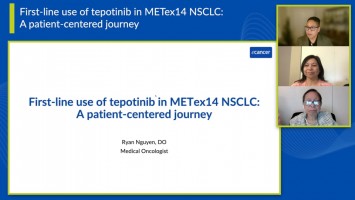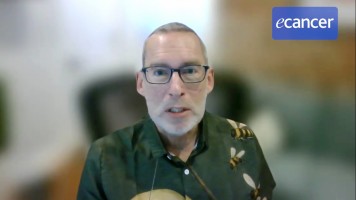Well, Jean Mossman, you’re talking here at the conference in Lyon about the patient’s perspective in cancer care. I know there are a few things you’re concerned about and let’s start with the regulatory process. You’ve got a new agent that’s potentially useful in cancer, you’ve got some groups and some data saying it’s great, how should the patient be involved in that? They’re not scientists.
No, they’re not scientists but the treatment is there to benefit the patient so it’s important we take the patient’s perspective into account. One of the challenges in cancer is that the regulatory process is focussed on safety and efficacy and if you’re a patient with metastatic cancer and you don’t have a long lifetime to live then safety is less important than efficacy. So I think we need to think about the balance between safety and efficacy in relation to new cancer drugs and ensure we reflect what matters to patients not the regulators.
But isn’t that happening now?
I don’t think so. I think that the regulator gets bogged down in the safety element rather than the efficacy element and it’s important that we don’t allow that to happen, or we try not to let that happen. So patients being involved in the process will help that be balanced better.
Could you give me an example of where this has gone wrong and how it could be done better?
The best example, because it’s fairly recent and because the regulatory body, the European Medicines Agency, listened to patients, is in relation to a treatment for multiple sclerosis where the regulatory agency were, as they say, minded not to approve it until they listened to the patients. Because this product had a late effect that might be quite serious for patients but the patients said, ‘We’ll live with that risk. We want this treatment now. Our lives now are really difficult day by day.’
This is bevacizumab? Sorry, I got that wrong.
No, no, this a… now I’ve forgotten the name of it.
We’ll leave this bit out, then, but carry on.
But the point was that the EMA actually took patients in, talked to them, listened to them and realised that the regulators are not the people swallowing these tablets, it’s the patients swallowing the tablets. So if the patients are willing to tolerate a level of risk then why are the regulators not willing to tolerate that as well?
Some of the latest medicines are hugely costly, the pharma industry has a tremendous incentive to convince the patients so is the patient opinion being manipulated?
I don’t think so. I’m sure there may be examples of that happening where patients are desperate to get access to treatment but, by and large, no. Patients need new treatments; people are still dying of cancer and the reality is everybody wants the same thing – we want the right patient to get the right treatment at the right time, whether that be government, payers, healthcare professionals, patients or pharma. So we need to find a mechanism to introduce new treatments; governments can negotiate with pharma about cost.
You have to balance cost against quality of life and the scientists use all sorts of terms, QALYs and so on, to measure how many life-years are going to be saved by a treatment. How do the patients face up to this sort of thing?
Well, there are two elements to your question; the first relates to patients facing up to the issue of healthcare gain being measured. I think everybody understands that healthcare budgets are limited and there need to be some difficult decisions being made but it’s the basis of those decisions and the QALY is not a good basis. The QALY is based on a measure called EQ-5D which was developed by asking the general public how they thought they might feel in a certain state of illness.
So you contest some of the tools being used by the professionals?
Yes, absolutely. Absolutely. I think if we’re going to be measuring treatment benefit, for example in bladder cancer, we should be talking to bladder cancer patients about what matters to them, what do they want to achieve with their treatment and using that to measure whether it provides value for money.
Sometimes the pharma companies are obsessed with extending life but sometimes at great cost to the quality of life. That’s a difficult one to judge what’s right, isn’t it?
But that’s a decision that an individual should be making because if you’re a person living with cancer what you want to achieve is going to be different for everybody. So for some people, I talk to cancer patients who their overwhelming desire is to live as long as possible; it might be because they’ve got something coming up in their life they want to be there for. But for other patients quality of life is really important, they don’t want heroics, they don’t want to be kept alive in a difficult situation. So it’s a discussion between a doctor and a patient.
Let’s talk a little bit about reimbursement because that’s an issue you’ve been looking into here at the conference in Lyon too, isn’t it? How are patients involved with decisions about the cost of medicines, the reimbursement for them?
In some countries patients are actively involved in processes such as in the UK. In England and Wales we have the National Institute for Health and Clinical Excellence and the patient perspective is brought into that. What we lack is the skills amongst patients to be able to present their case convincingly. Hard-nosed health economists are not convinced by the distress a patient might feel or the challenges that a patient might face, they’re convinced by numbers so we need to find ways to make the benefit a treatment brings portrayed in a number way that health economists will understand because they’re the people that seem to be holding the decision at the moment.
So you need to be able to quantify the emotions.
You need to be able to quantify the benefits; some of it will be emotion, some of it will be practical. It might be things like being able to look after your children or your husband or something like that. But you need to be able to quantify it from the patient perspective, not just in terms of how much the drug costs, how much it costs to have a day in hospital etc. The sorts of things that are traditionally not measured like can you have more days out of hospital with this treatment than you would with another treatment?
Now, I’m getting the message that you’re not fully satisfied with the system as it is. How not satisfied are you, say in Great Britain, for instance?
I think we have a long way to go to really listen to the patient perspective. The health economists are paid large sums of money to produce reports that reflect on the numbers, the health economics - how much does this treatment cost? What does it mean for healthcare systems etc.? What we just don’t do is think about what does it mean to patients and their families. How much do they value it? So we have a long way to go before that’s taken into account properly.
What do you need to do to put those tools into place so that the patients’ views and feelings really do get reflected?
We need to do two things. Firstly we need to train patients and patient groups to be able to stand up and argue their case, to negotiate etc. But we also need to persuade the reimbursement bodies that that patient perspective is as valid as anybody else’s perspective.
And the same is true for licensing drugs, for instance?
Yes. Again, we need to equip the patient organisations to be able to sit in a room full of drug regulators and not be completely terrified by the situation but to be able to make their case, to make their case eloquently and, as I say, to negotiate around the bits that matter to patients compared to what the regulators might be thinking about.
What about other forms of technology? Is that an issue patients can be involved with, new medical technology?
Absolutely, it really doesn’t matter whether it’s a drug, whether it’s a device, whether it’s a diagnostic process, whether it’s a new surgical technique. In all these things we should be thinking about the people who are going to be on the receiving end of it, the patients and the people who care for them, their family and friends etc. That view, that patient view, should be incorporated into any decision-making about healthcare.
Well, you’re at a meeting of national cancer institute directors here in Lyon, an international meeting, what is, finally, your call for action?
My call for action is to take much more account of what matters to patients and to make sure that we support patients to be able to deliver their views in a way that it can be incorporated into decision-making. Because being emotional and upset about your illness won’t convince hard-nosed health economists so we need to equip the patients to be able to do this and then we need to be able to persuade the decision makers to listen.
Jean, thank you very much for talking to us on ecancer.tv.
Thank you.








